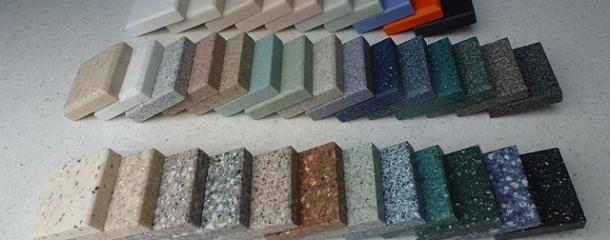CorianCorian is a composite material developed by the late 60's. The word for it used in English is "solid surface" as an umbrella term for that special composite material. Corian consists of a mixture of Mineral Gibbsit (an aluminium hydroxide which can be extracted from a naturally-occurring bauxite), colour pigments and an acrylate in the basic formular with its supporting material (catalysts, and hardener). Over the course of the years, numerous variations of the mixture has been developed by using, for instance, different acrylates in order to meet the customers' needs or to favour the artistic design. Since the expiration of the patent for the Fa. "Du Point" numerous other work material manufacturers developed their own variations of Corian and adjusted the mixture ratio according to the components. Features and processingCorian especially stands out in being able to conjoin construction components without any gaps, which bears high significance in a space with high hygienic standards (e.g. hospitals, kitchens, sanitary areas, etc.). The work material shows high resistance to environmental influences and can be enhanced and repaired by a expert on the basis of their thermal deformability. Corian can be almost arbitrarily deformed under the influence of warmth (temperatures of 60 to 160°C) and can be processed also with woodworking machines (panel sizing machine, CNC-machining centre usw.) as oppose to mineral components, like marble or engineered stone. Usage
Advantages
|
CNC machining centres, robots894
Edgebanding, edge processing622
Saws, cutting machines436
Planers, 4-sided moulders190
Routers, shapers, tenoners, profilers181
Drilling, mortising machines134
Presses, clamps, joining machines202
Sanding machines324
Mechanisation, storage, packing technology197
Surface coating149
Production lines125
Heating, drying, waste chopping63
Dust extraction, compressed air, vacuum139
Assembly, worktables15
Lathes29
Tools, sharpening technology99
Equipment, Other machines124

